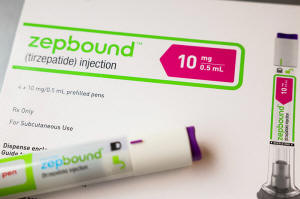Lilly says weight loss drug cut heart failure risk by 38% in trial
 Send a link to a friend
Send a link to a friend
 [August 01, 2024]
By Deena Beasley [August 01, 2024]
By Deena Beasley
(Reuters) - Trial results show Eli Lilly's weight loss drug Zepbound
reduces the risk of hospitalization, death and other outcomes for obese
adults with a common type of heart failure, the company said on Thursday
as it continues to build a case for the medication's wider health
benefits.
The drug, also known as tirzepatide, reduced the risk of a composite of
heart failure urgent visit or hospitalization, oral diuretic
intensification or cardiovascular death by 38% compared to a placebo.
The trial enrolled 731 patients across 10 countries who have heart
failure with preserved ejection fraction and obesity.
The condition "accounts for nearly half of all heart failure cases, and
in the U.S. almost 60% of those impacted also live with obesity," Jeff
Emmick, Lilly senior vice president, product development, said in a
statement.
Lilly said the study also showed the drug significantly improved heart
failure symptoms and physical limitations.

Heart failure is a condition in which the heart is unable to pump enough
blood to meet the body's needs. It is associated with a high burden of
symptoms and physical limitations affecting daily life, including
fatigue, shortness of breath, reduced ability to exercise and swelling
of extremities.
Trial patients on tirzepatide were given weekly injections of the
highest dose they could tolerate, up to 15 milligrams, and were followed
for a median of two years.
The drug led to 15.7% weight loss in the combined population of people
with and without type 2 diabetes, compared with 2.2% for the placebo,
Lilly said. For the non-diabetes patients, weight loss was 13.9%.
[to top of second column]
|

An injection pen of Zepbound, Eli Lilly’s weight loss drug, is
displayed in New York City, U.S., December 11, 2023. REUTERS/Brendan
McDermid/File Photo

Zepbound, also sold under the brand
name Mounjaro for type 2 diabetes, is part of a top-selling class of
drugs designed to mimic the action of the GLP-1 hormone, which helps
regulate blood sugar, slow digestion and decrease appetite.
Lilly said the most common side effects for trial patients on
tirzepatide were diarrhea, nausea, constipation and vomiting.
The company said it plans to submit the heart failure results to the
U.S. Food and Drug Administration and other regulatory agencies
starting later this year. The findings will also be presented at an
upcoming medical meeting and submitted to a peer-reviewed journal.
Novo Nordisk has reported data showing its GLP-1 weight loss drug
Wegovy reduces heart failure symptoms.
(Reporting By Deena Beasley; Editing by Chris Reese)
[© 2024 Thomson Reuters. All rights reserved.]This material may not be published,
broadcast, rewritten or redistributed.
Thompson Reuters is solely responsible for this content.
 |